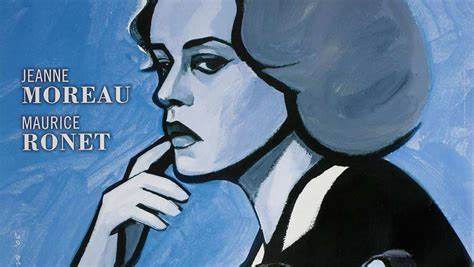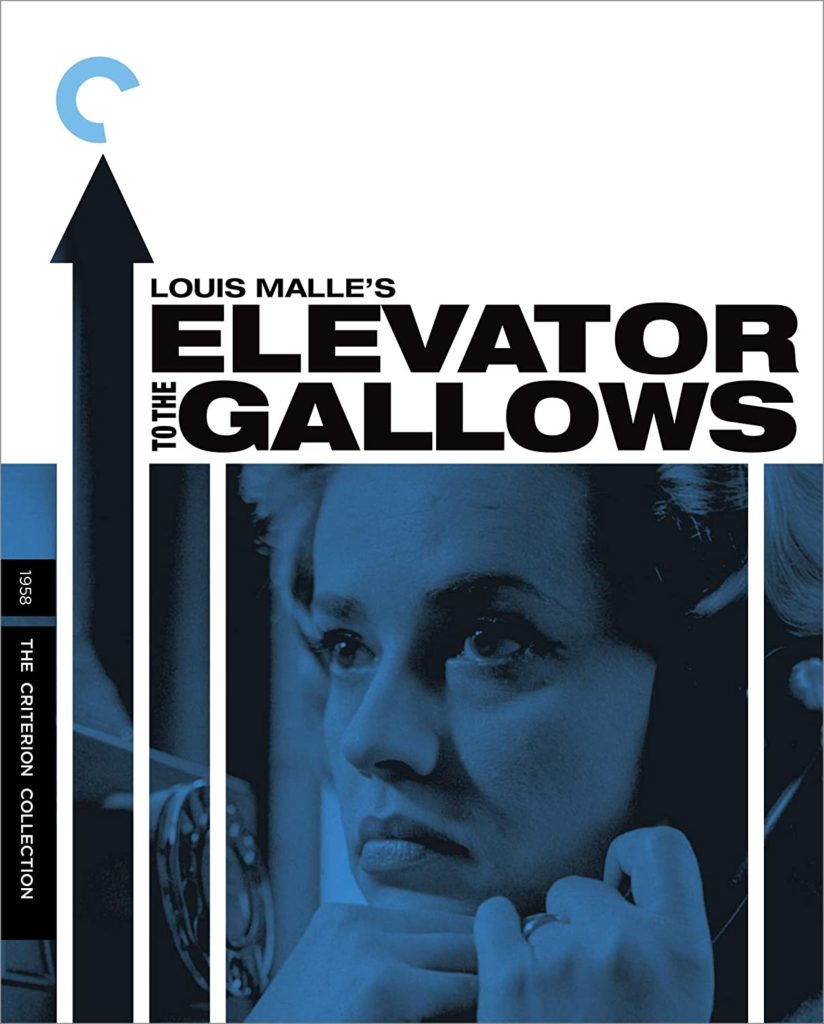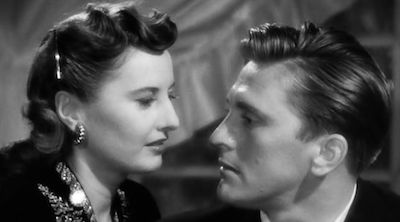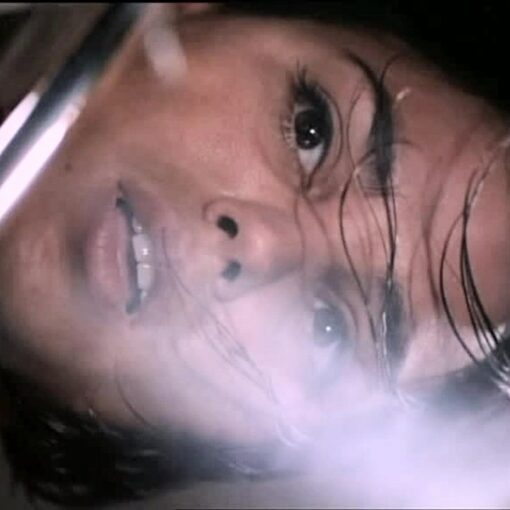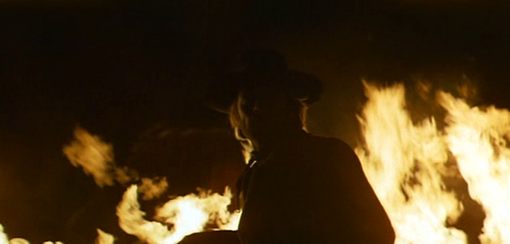“Crime doesn’t pay” is a well-defined trope explored in the world of cinema. A simpler examination of this trope could be in form of the villainous characters receiving their comeuppance at the hands of the heroic forces like Indio being shot to death in a duel against Colonel Mortimer in Sergio Leone‘s For A Few Dollars More (1965).
Or you could have Jean Pierre Melville‘s Le Doulos (1962) where everyone is a character in the ‘grey’, the story is told from the perspective of these characters (Hence, the audience is made to associate with them) and yet, the crimes come back to haunt the perpetrators. There could also be a natural turn of events, some intervention, misunderstanding, etc. which complicates the story and makes the criminal commit an unintended error.
An interesting and related trope that plays out during some of these crime capers in which “Crime doesn’t pay” is “Crime becoming Punishment itself“. The terror and travails that the criminal experiences while waiting for his/her ultimate fate hounds them to the end.
Both these tropes are present and play an important role in Louis Malle‘s Elevator to The Gallows (1958).

The opening credits establish the passionate love that exists between Florence Carala (Jeanne Moreau) and Julien Tavernier (Maurice Ronet). While Tavernier, the former paratrooper, tells Florence that “Love isn’t Daring“, he’d soon be embarking on the riskiest mission of his life.
They’re going to kill Florence’s husband and his boss, the shady businessman Simon Carala. The trained killer Tavernier takes a risky route to kill Simon and make it appear like a suicide. He nearly succeeds but leaves behind an incriminating piece of evidence. He returns to retrieve it. He is in the elevator when the guard switches off the power and leaves as the office hours are done. Tavernier is stuck inside.
Meanwhile, Veronique (Yori Bertin), a flower girl, and her boyfriend Louis (Georges Poujouly) steal Tavernier’s car for a joyride. In the absence of Julien, Florence starts looking for him.
The story then becomes about these three developments. It is a suspenseful mystery involving Tavernier’s detention in the lift. It also looks into the reckless journey undertaken by the young couple in Tavernier’s car. At the same time, it is about Florence’s search for her love even as she is running through mixed emotions.
Tavernier is a trained man and doesn’t lose his cool in his unfortunate circumstances. He puts the facts before himself “Florence is waiting. My engine’s running.”, and then seeks to explore a way out of his misery. However, all his best attempts go to waste.
Along with Tavernier, the viewer too is put in a claustrophobic situation. They are made to feel his fears, his relentless attempts at escaping, and the failures he faces.

At the other end are Louis and Veronique who have stolen Tavernier’s car. Louis displays the mindless exuberance of youth, acting on his impulsive desires rather than thinking through his actions. He’s a wannabe adventurer and a thief. He takes away Tavernier’s Chevrolet and later reveals to us that he had stolen in the past as well. There’s no surprise when he seeks to get away with the German couple’s Mercedes as well.
Veronique on the other hand is the hesitant accomplice. She tries to stop Louis initially (When Louis is planning to make it away with Tavernier’s Chevrolet, she chides him with “Every time we go out, you ruin things” “Get out! If you have an accident don’t ask me for help.”), but later joins him in his plans.
One of her first utterances makes it clear to the audience as to who is the boss in this relationship, “Sure you are smarter than me. You read. It gives you great ideas.” It is only when Louis has gone too far ahead of himself when Veronique takes the lead.
The youngsters display a need to behave beyond their years. However, this doesn’t hold well in the movie.
Louis is attracted to Tavernier’s Chevrolet and steals it. However, when they look at the contents of the car (A revolver, a camera, some documents), they are taken aback.
Louis is a young teenager but tries to present himself as an experienced paratrooper to the German. His deceit is pretty quickly exposed which leads to the hot-headed Louis getting even more erratic.
In the middle of it all, we have Florence who is looking for her lost love. She has entered a dream-like state in the very first telephonic conversation with Julien. Towards the end of her conversation with Julien, she states “I’ll be waiting. Waiting only for you. Thirty minutes from now.” She ends the call and hugs the telephone in the telephone booth as if resting herself after some great exertion. Meanwhile, Julien is still awaiting her response on the other side.
She never does leave this dream-like state. Her night becomes an endless torment, being spent in the search of her beloved. Throughout this search, she goes through a number of emotions. She is confused when she mistakes Louis for Julien and believes that Julien is driving away with the flower girl, Veronique. Her fears and worries are already visible on her face. Soon after she encounters a car salesperson known to her, but all she can think about is Julien.
She repeats the words she spoke to the salesperson in her head (“Happy. Very Happy!“), but the context is very different. She looks like she hasn’t known happiness for some time now. Soon, in her thoughts, she seemingly concludes that Julien didn’t kill her husband and is running away like a coward. She believes that Julien doesn’t “…dare to be happy.”
Earlier, she had poked fun at him for his love not having enough courage. Now, these fears have resurfaced. When he had responded with “Love isn’t daring“, she had said, “Don’t say that.”
Tavernier is an ex-paratrooper and meticulously plans the murder of Simon Carala. Florence, on the other hand, is not a schemer. This becomes a ‘daring’ act for her. One which is needed to immortalize their love. She is constantly worried about their fate.
As the night sets in, her fears compound.
She moves from one place to another in search of Julien. The storm sets in but it doesn’t deter her. She behaves as if she’s in a trance: walking into oncoming traffic, talking to herself even as others keep looking at her, and visiting places she wouldn’t at this hour of the night.

The viewer is made to feel her loss of grip over reality. Her desperate and unfulfilled need for her lover makes her see Julien in men who remotely resemble him. Soon, it seems that she’s inquiring about Julien’s whereabouts from all and sundry. Her haunting comes to an end when she’s taken into police custody along with patrons of a local tavern.
While the movie is a crime noir where every criminal ends up committing some cardinal mistake that leads to their downfall, its exploration of related aspects makes it special.
There is the question of sleep. Both the pair of lovers: Julien-Florence and Louis-Veronique have troubles with sleep. Julien spends most of the night exhausting himself, trying to figure out an escape from his miserable situation. Florence doesn’t know of sleep because of her troubled state of mind. When her trials come to an end, she is finally ready to think about sleep. (“No more aging, no more days. I’ll go to sleep. I’ll wake up alone.“)
Even when Veronique has slept for some time, the criminal-minded Louis forces her to wake up. After the unfortunate incident involving the Germans, the young lovers are also on the run. Finally, Veronique takes the issue into her hands and decides that their sleep will be an eternal one.
There is a belief in immortal love which governs the actions of certain characters in Elevator to The Gallows.
When the volatile, angry young Louis gathers some perspective over what he has done, Veronique believes that they’d be arrested and separated for his crimes. She is further perturbed when Louis says “My head will roll.”, but her primary concern seems to be the idea that the two lovers will be separated from each other.
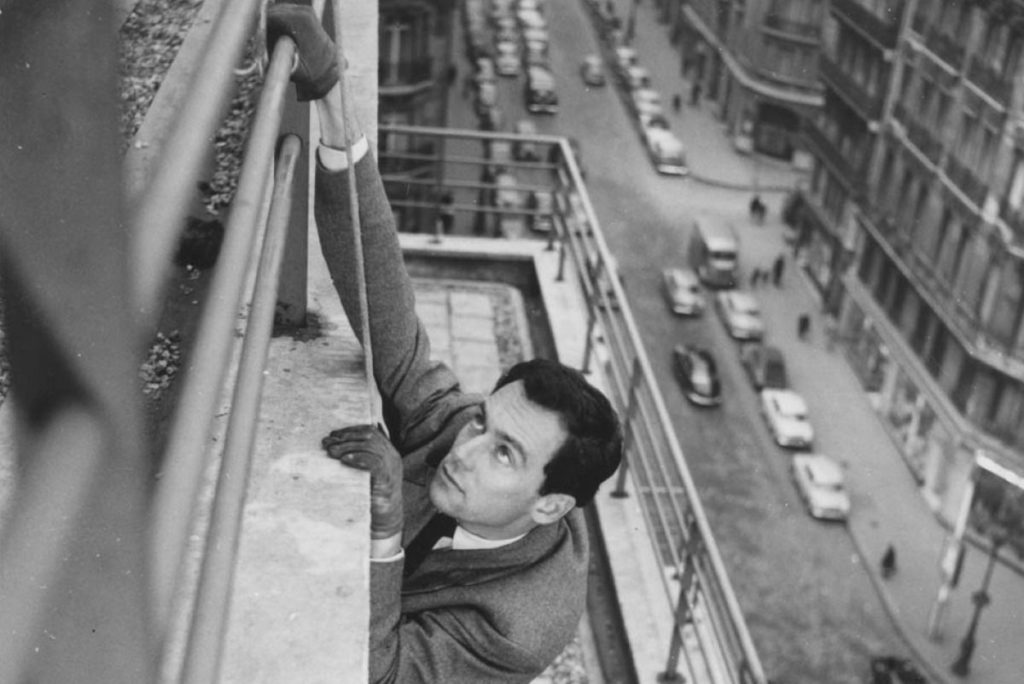
Suddenly, she converts this Bonnie and Clyde scenario to a Romeo and Juliet fantasy. (“We’ll only be together in headlines.”)
As the tough-on-the-exterior yet impulsive actor Louis loses the leader’s role in the time of crisis, Veronique works a way out. She wouldn’t let them hurt Louis. (“We’ll never be apart… Our picture on the front page ‘The Tragic Lovers’ “) She won’t let them be separated. (“We’ll die together.“)
This decision is later mocked by Florence, but her understanding of love is no less different from that of Veronique.
When she is confronted with the realization that her time is up after encountering Cherrier (Lino Ventura), she returns to her previously unstable state. She starts talking to Julien and herself “…I wasn’t indulgent. But I know I still loved you. I wasn’t only thinking of myself. I’ll be old from now on.”
She pauses for a moment and then looks at the recently developed photo “But we’re together here. Together again, somewhere. You see, they can’t keep us apart.” The idea of eternity of love returns to the screen.
An interesting aspect is that the viewer never gets to see Florence and Julien together on the screen. However, Louis Malle is still able to convey the fervent bond of affection that exists between the two, especially from Florence’s perspective.
Buy BluRay: From Amazon.com | From Amazon.co.uk (better: Louis Malle collection box) | From Amazon.fr | From Amazon.de
Stream: Prime Video USA | Prime Video UK | Prime Video DE

